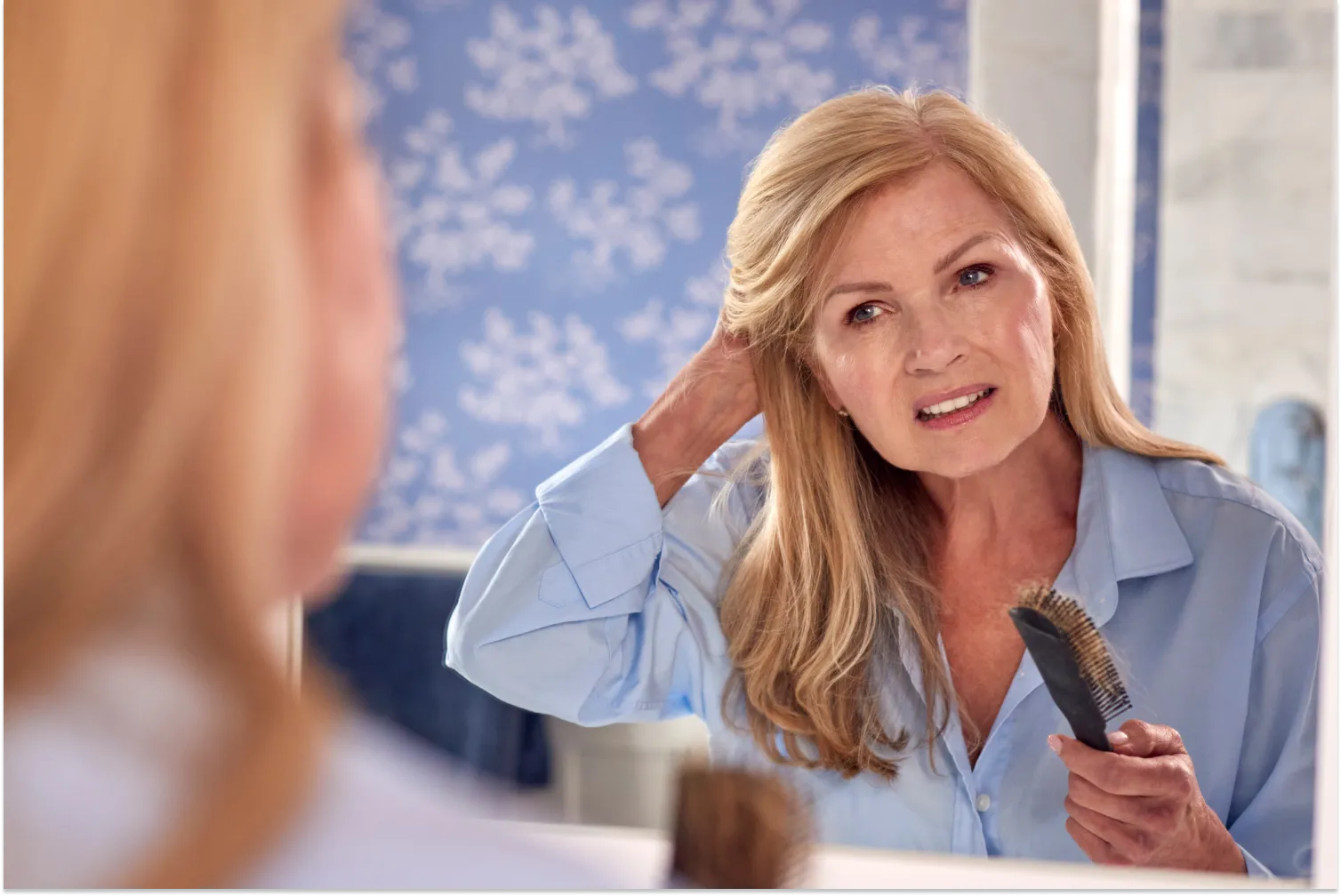Hot flashes and night sweats are among the most common and disruptive symptoms women experience during the perimenopause and menopausal transition.
As estrogen levels decline during this time - and often long before - hormonal and psychological changes often occur. Among the most common menopause symptoms are hot flashes and night sweats, known as vasomotor symptoms. These can interfere with daily activities, disrupt sleep, and impact overall well-being. Many women find them particularly distressing due to their unpredictable frequency and intensity.
In the United States, approximately 75% of women begin experiencing hot flashes during perimenopause. Understanding the menopausal transition can help you recognise early symptoms and explore effective treatments, including dietary changes and oral medications. Managing hot flashes and night sweats isn't just about comfort, it's essential to maintaining overall well-being.

Understanding Hot Flashes and Night Sweats
Hot flashes and night sweats are among the most common symptoms of menopause.
A hot flash is a sudden, intense sensation of heat, typically affecting the upper body and often followed by sweating and flushed skin. When these episodes happen at night, they're called night sweats, and they can disrupt sleep, leaving you fatigued and irritable. While most hot flashes last between one and five minutes, in some cases they may persist for up to an hour.
These symptoms are triggered by hormonal changes. As estrogen levels decline, the hypothalamus - your body's internal thermostat - becomes more sensitive, mistakenly sensing overheating. In response, the body tries to cool down, triggering hot flashes or night sweats.
Some women experience them occasionally, while others may have several episodes each day. Severity varies from mild warmth to intense heat that soaks clothing and sheets. Managing these symptoms is important for maintaining comfort, sleep quality, and overall well-being.
Lifestyle changes such as avoiding caffeine and spicy foods can help reduce frequency and intensity. For some women, hormone therapy may also be an effective treatment option. Exploring what works best for your body is the first step toward lasting relief.
Causes and Triggers of Hot Flashes and Night Sweats
Hot flashes and night sweats are textbook symptoms of menopause, experienced by the majority of women during the transition. While hormonal changes - particularly declining estrogen - are the main cause, other factors can influence how often and how severely these symptoms occur.
Medical conditions, such as thyroid disorders, and side effects from certain medications can intensify vasomotor symptoms. Lifestyle choices, including diet, smoking, and alcohol consumption, can also act as triggers.
Understanding these contributing factors is key to finding the right combination of relief strategies for your individual needs.
Hormonal Changes and Declining Estrogen Levels
Menopausal symptoms, such as hot flashes and night sweats, are primarily caused by hormonal shifts -especially declining estrogen levels. This hormone plays a key role in regulating the body's temperature, so reduced estrogen can disrupt the hypothalamus (your internal thermostat), leading to sudden heat surges and night sweats that disturb sleep.
While estrogen decline is the most common cause of these vasomotor symptoms, other factors can contribute or mimic them. Thyroid disorders, including hypothyroidism and hyperthyroidism, may also affect the body's ability to regulate temperature. These conditions can cause similar symptoms to menopause, making it important to rule them out during diagnosis.
Certain medications, such as antidepressants or blood pressure treatments, can also interfere with temperature control. Lifestyle habits, like smoking and excessive alcohol consumption, may further worsen symptoms.
Common Triggers of Hot Flashes and Night Sweats
Managing common triggers can help reduce the intensity and frequency of hot flashes and night sweats.
Consuming coffee, tea, and sodas can stimulate the central nervous system and trigger hot flashes. Alcohol can also cause vasodilation, leading to sudden feelings of heat. Spicy foods can raise core body temperature and contribute to hot flashes in some individuals. Additionally, stress can activate the body's stress response system, possibly triggering or intensifying night sweats.
Lifestyle Changes for Symptom Management
While lifestyle changes alone may not eliminate hot flashes and night sweats, they can help reduce their frequency and severity. For many women, healthy habits play a supportive role in managing menopause symptoms - especially when combined with other treatments like hormone therapy. Improving your diet, staying active, managing stress, and getting better sleep can all contribute to overall well-being during the menopausal transition.
Although hot flashes may eventually fade, their intensity can disrupt daily life and sleep in the meantime. In such cases, you must make some lifestyle changes to get relief from these symptoms. These steps not only ease symptoms but also support overall long-term health.
Dietary Recommendations
Nutrition is one of the first lines of support for managing menopause symptoms.
One possible strategy for maintaining steady hormone levels is to increase the consumption of phytoestrogen-rich foods such as beans, soy products, and flaxseeds. These chemicals derived from plants can lessen the intensity of hot flashes by acting as estrogen in the body.
Foods rich in omega-3 fatty acids, such as chia seeds and walnuts, and fatty fish like mackerel and salmon, are good for your heart and may even help lower inflammation. Eating foods like almonds, berries, and leafy greens, which are high in antioxidants, may also help keep you healthy.
Spicy meals raise core body temperature and induce perspiration, while caffeine and alcohol make hot flashes worse and make it harder to sleep. Reducing their consumption can alleviate symptoms significantly.
Hydration
Staying hydrated is a must if you want to prevent menopausal symptoms. Dehydration can worsen fatigue and heat flashes.
Consume at least eight glasses of water every day. Another way to stay hydrated is to drink herbal teas or eat water-dense foods like watermelon or cucumbers. A water bottle on hand can remind you to stay hydrated.
Physical Activity
Menopausal women might get several advantages from maintaining an active lifestyle.
Aerobic activities, like swimming, cycling, or brisk walking, are good for your heart and help lessen the severity of hot flashes. Because the risk of osteoporosis rises after menopause, engaging in strength training activities is very important to keep muscle mass and bone density at a minimum. Yoga and Pilates are great flexibility exercises since they improve balance, lower tension, and increase mood by making you relax.
Reducing Stress
Stress management will help you manage menopausal symptoms.
Engage in deep breathing exercises and meditation to feel better emotionally and less stressed. Yoga combines physical postures with controlled breathing to promote balance and relaxation. Relaxation techniques like guided visualization and progressive muscle relaxation will help you alleviate stress and anxiety.
Practice Good Sleep Hygiene
Getting a good night's sleep is essential to controlling night sweats and maintaining good health.
Use breathable bedding and keep the room at a reasonable temperature using air conditioning or portable fans to create a cool and pleasant resting environment. One way to control one's internal clock is to establish a routine and follow a regular sleep pattern. Read a book or soak in a warm bath before bed to help your body wind down and prepare for sleep.

Medical Treatments and Therapies For Hot flashes and Night Sweats
It's important to explore different medical treatments and therapies for managing menopausal symptoms, as menopause affects each woman differently.
One must find a treatment that works for you to alleviate symptoms and reduce risks. Women should work with a healthcare professional to explore menopausal therapy choices based on the latest research and their health profile to improve their quality of life and general health while managing menopause.
Hormone Replacement Therapy: Say Goodbye to Hot Flashes and Night Sweats
Menopausal hormone therapy, more commonly known as Hormone Replacement Therapy (HRT), is the most effective way to relieve symptoms such as hot flashes, night sweats, and vaginal dryness. At Fem Excel, we prescribe bioidentical hormones - compounds that are structurally identical to the hormones naturally produced by your body. Often described as a more "natural" form of HRT, bioidentical hormone replacement therapy (BHRT) offers personalised, medically guided relief that aligns with your body's own chemistry.
When prescribed thoughtfully and tailored to your needs, bioidentical hormone replacement therapy (BHRT) delivers powerful relief with minimal risk. It is particularly effective for relieving vasomotor symptoms like hot flashes and night sweats and also plays a vital role in protecting long-term health, including bone density, heart health, and metabolic function.
HRT is available in various forms, including oral tablets, skin patches, creams, gels, and vaginal inserts. The best delivery method depends on your symptoms, preferences, and overall health profile. Our providers work with you to find the most effective, personalised treatment plan.
Non-Hormonal Medications
For those who do not want to go for HRT, there are non-hormonal medication options available.
Antidepressants called selective serotonin reuptake inhibitors (SSRIs) and the blood pressure medicine clonidine have been shown to reduce the frequency and severity of hot flashes and improve general mood. Gabapentin, often used for nerve discomfort or seizures, may also help with hot flashes and poor sleep quality.
The effectiveness of these drugs varies from person to person, and a healthcare practitioner will assess a patient's requirements and medical history to recommend the best course of treatment.
Alternative Therapies
In addition to hormone therapy, some women explore complementary approaches to ease menopause symptoms - especially when looking for additional lifestyle support.
Herbal supplements such as evening primrose oil, red clover, and black cohosh are popular options. These may contain phytoestrogens - plant-based compounds that mimic estrogen in the body - and some women report relief from hot flashes and other menopause symptoms. However, these supplements are not regulated, and clinical evidence on their effectiveness is mixed. They may also interact with medications or hormone therapies.
Soy isoflavones, found in soy milk, soybeans, and tofu, are another source of phytoestrogens that may help maintain hormonal balance and reduce hot flashes for some individuals.
Natural Remedies and Home Practices
You can support better health by exploring plant-based treatments and practical home remedies.
Herbal Medicines
Some women turn to herbal medicines for relief from menopause symptoms, particularly hot flashes and night sweats.
Black cohosh, a plant native to North America, is one of the most commonly used herbal supplements for managing vasomotor symptoms. While some studies have shown promising results, more research is needed to confirm its long-term safety and effectiveness.
Red clover is another popular option. It contains phytoestrogens - plant-based compounds that mimic estrogen in the body - which may help reduce hot flashes in some women.
Soy isoflavones, found in foods like soy milk, soybeans, and tofu, are also a rich source of phytoestrogens. Regular consumption may help support hormonal balance and reduce the frequency of hot flashes for some individuals.
While herbal remedies may offer relief, they are not regulated like prescription medications, and their effects can vary widely. It's important to consult a healthcare provider before starting any supplement, especially if you're already using hormone therapy or other medications.
Quick Fixes
When you're having a hot flash, deep breathing techniques can help right away. Take slow, deep breaths to calm your nervous system and make hot flashes less intense.
Furthermore, put a cold pack on your face or neck during a hot flash to quickly cool yourself down and help you feel better. Cooling pillows can also help keep your body temperature steady while you sleep. They are made of materials that remove heat and keep the surface cool, helping prevent night sweats.
Use breathable fabrics and moisture-wicking materials for clothing to help manage night sweats by promoting temperature regulation. A fan beside your bed can help move air around and cool your room. Lower the thermostat at night to keep the house cool. Practicing these at home can help you manage menopause symptoms.
Listen to your body and try different things until you find the best ones. Before getting a new treatment, consult your doctor to ensure it is safe and right for your needs.
Why HRT Matters, Even Without Hot Flashes
Even if you don't experience hot flashes or night sweats, hormone therapy can still play a critical role in protecting your long-term health. Estrogen supports cardiovascular health, bone density, brain function, and metabolic balance. As these systems become more vulnerable during and after menopause, HRT can help reduce the risk of age-related diseases such as osteoporosis, heart disease, and cognitive decline.
That's why we view hormone therapy not just as symptom relief, but as a powerful tool for proactive, preventive care throughout every stage of menopause.
When to Seek Professional Help
It's important to recognize when menopausal symptoms require medical attention.
If hot flashes, night sweats, or mood swings significantly affect your daily life, it's time to seek professional help immediately. Certain health issues, such as thyroid problems or heart disease, can mimic menopausal symptoms. Having these conditions properly diagnosed and treated by a healthcare provider is important.
They can differentiate between menopause and other health issues to ensure you receive the appropriate care. Regular check-ups are crucial for managing menopause. These appointments allow doctors to monitor symptoms and your overall health. Discuss any concerns with your doctor. They can advise, recommend treatments, and offer support based on your needs.
Seeking professional help will ensure you receive the right care, which can greatly improve your quality of life during menopause.
Conclusion: Hot Flashes and Night Sweats
Dealing with hot flashes and night sweats requires a personalized approach.
Try different strategies like lifestyle adjustments, medical treatments, or natural remedies to determine what works best for you. It's important to remember that menopause is a normal part of life, not a medical condition. Embracing this change and prioritizing self-care can significantly impact how you experience these symptoms.
Focus on your well-being by staying informed, seeking assistance when needed, and making changes to enhance your comfort and quality of life during this time.
Ready to feel like yourself again?
At Fem Excel, our providers specialise in personalised bioidentical HRT to help women navigate menopause with confidence.
HAVE SYMPTOMS?
Take Free Assessment






